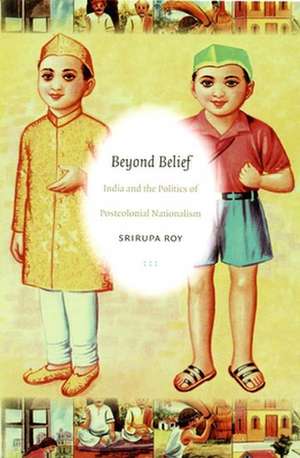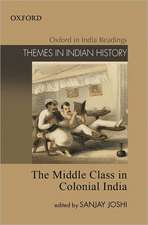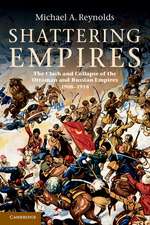Beyond Belief – India and the Politics of Postcolonial Nationalism: Politics, History, and Culture
Autor Srirupa Royen Limba Engleză Paperback – 27 mai 2007
Din seria Politics, History, and Culture
-
 Preț: 240.73 lei
Preț: 240.73 lei -
 Preț: 210.26 lei
Preț: 210.26 lei -
 Preț: 247.63 lei
Preț: 247.63 lei -
 Preț: 265.79 lei
Preț: 265.79 lei -
 Preț: 238.39 lei
Preț: 238.39 lei -
 Preț: 263.47 lei
Preț: 263.47 lei -
 Preț: 306.60 lei
Preț: 306.60 lei -
 Preț: 264.26 lei
Preț: 264.26 lei -
 Preț: 305.61 lei
Preț: 305.61 lei -
 Preț: 262.70 lei
Preț: 262.70 lei -
 Preț: 303.33 lei
Preț: 303.33 lei -
 Preț: 262.52 lei
Preț: 262.52 lei -
 Preț: 212.48 lei
Preț: 212.48 lei -
 Preț: 261.56 lei
Preț: 261.56 lei -
 Preț: 262.32 lei
Preț: 262.32 lei -
 Preț: 230.02 lei
Preț: 230.02 lei -
 Preț: 237.47 lei
Preț: 237.47 lei -
 Preț: 335.88 lei
Preț: 335.88 lei -
 Preț: 300.83 lei
Preț: 300.83 lei -
 Preț: 261.56 lei
Preț: 261.56 lei -
 Preț: 238.39 lei
Preț: 238.39 lei -
 Preț: 238.01 lei
Preț: 238.01 lei -
 Preț: 262.14 lei
Preț: 262.14 lei -
 Preț: 312.74 lei
Preț: 312.74 lei -
 Preț: 260.41 lei
Preț: 260.41 lei -
 Preț: 310.83 lei
Preț: 310.83 lei -
 Preț: 300.24 lei
Preț: 300.24 lei -
 Preț: 335.12 lei
Preț: 335.12 lei -
 Preț: 234.61 lei
Preț: 234.61 lei -
 Preț: 223.65 lei
Preț: 223.65 lei -
 Preț: 256.06 lei
Preț: 256.06 lei
Preț: 261.56 lei
Nou
Puncte Express: 392
Preț estimativ în valută:
50.06€ • 52.07$ • 41.32£
50.06€ • 52.07$ • 41.32£
Carte tipărită la comandă
Livrare economică 14-28 aprilie
Preluare comenzi: 021 569.72.76
Specificații
ISBN-13: 9780822340010
ISBN-10: 0822340011
Pagini: 264
Ilustrații: 9 illustrations
Dimensiuni: 167 x 231 x 16 mm
Greutate: 0.39 kg
Editura: MD – Duke University Press
Seria Politics, History, and Culture
ISBN-10: 0822340011
Pagini: 264
Ilustrații: 9 illustrations
Dimensiuni: 167 x 231 x 16 mm
Greutate: 0.39 kg
Editura: MD – Duke University Press
Seria Politics, History, and Culture
Recenzii
This book marks a departure in the study of Indian nationalism. Srirupa Roys idea that nationalism works not as a belief but through practices that seek to ground the state deeply in the life of the people, is demonstrated here by archival and ethnographic explorations of specific sites: rituals and pageantry of the state, official newsreels and documentaries, planned scientific institutions and industrial cities. The result is fine-grained political analysis enriched at every turn by the authors judicious use of history and ethnography.Dipesh Chakrabarty, author of Habitations of Modernity: Essays in the Wake of Subaltern StudiesSrirupa Roy offers fresh, innovative, and highly original perspectives on how the Indian nation-state set out to manufacture a national modernity and new ways of presenting itself. This is a much needed contribution to a critical assessment of the now quasi-mythical Nehruvian decades of postcolonial state formation from one of the best political scientists writing on India today.Thomas Blom Hansen, coeditor of States of Imagination: Ethnographic Explorations of the Postcolonial State
Notă biografică
Textul de pe ultima copertă
"Srirupa Roy offers fresh, innovative, and highly original perspectives on how the Indian nation-state set out to manufacture a national modernity and new ways of presenting itself. This is a much needed contribution to a critical assessment of the now quasi-mythical Nehruvian decades of postcolonial state formation from one of the best political scientists writing on India today."--Thomas Blom Hansen, University of Amsterdam
Cuprins
Descriere
Examines the formation of the nation-state in postcolonial India, how it worked to create an identity for itself, to what extent it succeeded, and what may be the prospects for unity in a widely diverse country











